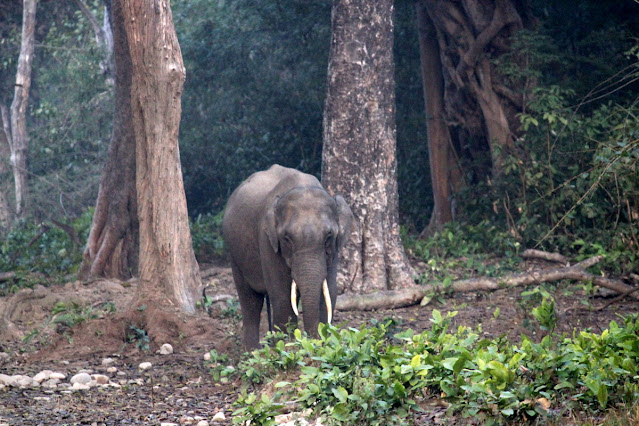Letter to the Editor - ELEPHANT KILLING INCIDENT IN KERALA
The recent incident of brutal killing
of a
pregnant elephant in southern Indian state of Kerala by feeding the pineapple
stuffed with crackers has caused wide spread sensation and criticism in the entire nation. This
unpleasant incident exposes the extent of human cruelty. The
suffering of the female elephant in Kerala's Silent Valley
shook everyone, especially the animal lovers. It was hard to imagine the plight
of the mother and her child.
It was extremely disheartening and shocking to associate this with the state of Kerala, which is recognized as
a complete literate state. Despite having many feathers in its cap like high
literacy rate and great tourism attractions, it has lost its sensitivity towards animals.
As per Hindu traditions, elephants are sacred animals. They are considered to be the living
incarnation of God Ganesha, the most revered one. The Indian culture prevents
them from being killed, even though they may bring destruction to people and
property. In Christianity, the elephant is seen as a symbol of patience,
chastity and temperance. But even if there were no religious taboos as such, there
cannot be any good reason for harming an animal.
In
our culture, special significance is given to the act of feeding the animals who are needy
and deprived. In our Vedas and scriptures also, there is mention of the
importance of feeding animals and how by feeding animals, you can exonerate.
But, the rich endowment of our traditional knowledge which has been transmitted orally from generation to generation
seems to be vanishing gradually. Instead of feeding the hungry elephant, some
evil-doers gave her food bomb and later it was called unintentional and
mistake. Can such acts be ignored? It will not be exaggeration if I and many
others would describe it as a murder
and the crime of intentional killing.
Furthermore, killing
animals is prohibited under law and anyone, who mistreats them is deemed fit for
punishment. But statistics say that their numbers are constantly
declining and, on an average, at least 80 elephants are killed annually. Elephants are
not only endangered species, but they also play a very
important role in maintaining the biodiversity of the ecosystems in which they
live. Thus,
saving their life should be our prime concern. Harming them by mistake or for
fun cannot be entertained.
This
act of heinous crime is unforgivable. It aroused the strong belief in
the society that humanity has failed again. It is unthinkable that the animal,
which is the gift of nature to us, may see such a terrible and painful end. We
must all give a serious thought to it so that such brutal incidents are not
repeated again and the culprits should be put behind bars.
----------------------------------------------------------------------------------------------------------------
Excerpts from the newspaper article
Laws make no sense if not enforced. And people will
play with animals till we realise the right to co-existence
All of humanity needs to hang its head in shame for an
inhuman deed that took place on May 27 in Malappuram, Kerala.
A 15-year-old pregnant tusker, looking for food, strayed into a village where
the trusting and unsuspecting creature was fed a pineapple stuffed with crackers.
The fruit exploded in the elephant’s mouth ripping off a part of its face and
tongue. The poor pachyderm, despite being in intense pain, ran through the
streets without harming a soul till it came to the river. It stood in the water
for hours, defeating all attempts by the forest department to help it, before
dying a slow and excruciating death due to the injuries and asphyxia as water
had gone into its lungs and trachea. Sadly, this is not the first incident of
such unspeakable cruelty inflicted on animals in India. A similar incident had
happened in Kollam with another elephant in April where the animal had eaten
fruits laden with explosives and died a slow and painful death. So, the
question is how is it that the perpetrators of such heinous crimes go
unpunished when cruelty against animals is a cognisable offence under Section
428 and Section 429 of the Indian Penal Code and the country also has one of
the strictest wildlife protection laws in the world? While some countries are
now waking up to regulating trade in wildlife, India leads the prohibition on
ivory trade. Some of the biggest triumphs for animal welfare here in the last
decade saw the ban of dolphinariums in 2013, prohibition on animal testing for
cosmetics in 2014, followed by a ban on the import of cosmetics tested on
animals. India also prohibited the export of shark fins for use in soup and
does not allow wild animals in circuses.
Yet we are confronted with heart-wrenching stories of
depraved behaviour towards animals. For this to stop, we must make our law
enforcement agencies aware about the rights of animals to be treated with
kindness and dignity and about how grave an offence it is to subject an animal
to cruelty. Punishment should be quick and stringent. Law enforcement agencies
must not always wait for activist judges to lead the way in this regard. Plus,
we, as a society must teach our children the basic truth that the world is
meant to be shared by all God’s creations and we must learn to live together
with them. They have as much right to live on this planet as we do. In fact,
animals form a vital part of the biodiversity and each creature has a role to
play in the circle of life. If we disrupt that, we will have to bear the
consequences of it.




Comments
Post a Comment